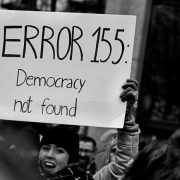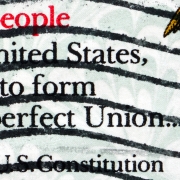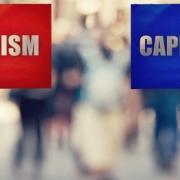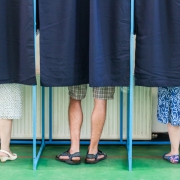Among the most important advances in the social sciences of the 20th century is Kenneth Arrow’s Impossibility Theorem. The full explanation of this theorem first appeared in Arrow’s 1951 book, Social Choice and Individual Values. As explanations go, this one is especially beautiful in its rigor, yet highly technical and inaccessible to the general public. But it can be summarized well-enough: Arrow proved that a collection of people has no “will” in the way that we understand each individual person to have a will.
Stated more fully, Arrow proved that it’s impossible to devise any method of discovering the preferences of two or more persons and then aggregating these preferences into a single set of preferences of the sort that is possessed by each individual person.
One welcome implication today of Arrow’s Theorem is that it reaffirms our understanding that a monarch or dictator who boasts of embodying or carrying out “the will of the people” of the country is either lying or delusional. An implication far less welcome today – although one no less indisputable – is that the results of even the fairest and most-inclusive democratic decision-making procedure are not the will of the people. Indeed, these results are not even the will of the voters. Because two or more people do not share a single mind, no group of people has wants, hopes, and fears in the same way that each individual experiences these attitudes and desires.
Arrow’s proof does not discredit majority-rule democracy as an acceptable – indeed, perhaps as the best available – method for making collective decisions. If, say, the government is charged with supplying national defense, some variety of inclusive democratic decision-making is arguably the best practical means of choosing the size of the annual defense budget. Not only does each and every adult in the political community have the opportunity to register his or her preference, this procedure also ensures against the selection of options that are wildly unpopular.
All good. But the chosen outcome should not be accorded a status that it doesn’t deserve: the chosen outcome is not the will of the people. It’s simply the outcome of the collective-decision-making procedure.
“The People” Is No Person
Another way to put Arrow’s point is to say that it is a gross error to anthropomorphize a group of people, even when that group makes collective decisions according to democratic norms.
Perhaps the single best way to see why such anthropomorphization is an error is to consider what Arrow identified for each individual decision-maker as being the “irrelevance of independent alternatives.” The language here is confusingly technical, but the idea is not – as revealed by this example that I steal from a lecture given a few years ago by my colleague Alex Tabarrok.
Suppose that you have a hankering for a scoop of ice cream. To satisfy this hankering, you stroll into a diner and ask the waiter what flavors of ice cream are available. The waiter replies, “We have vanilla and chocolate.” You weigh these two options for a moment and then tell the waiter, “Please give me a scoop of vanilla.” But just as the waiter is about to serve the vanilla to you, he says, “Oh, I almost forgot. We also have strawberry ice cream.”
How would you, a rational individual, respond upon learning of this additional alternative? You might respond by saying, “Wonderful! I love strawberry! Give me a scoop of strawberry instead.” If you respond in this way, no one would think you odd.
But suppose that you instead respond by telling the waiter, “Oh, now that I know that strawberry is also an option, please change my order from vanilla to chocolate.” If you respond in this way, everyone would think you to be crazy-odd. Normal – “rational” – individuals don’t react in such a manner. An individual who prefers vanilla to chocolate does not come to prefer chocolate to vanilla upon learning of the availability of strawberry.
Yet in political elections such ‘preference shifting’ is neither unusual nor an indication of irrational or otherwise inexplicable behavior on the part of anyone.
For example, it’s quite possible that Ross Perot’s 1992 candidacy for the U.S. presidency – by taking more popular votes from Pres. George H.W. Bush than from Gov. Bill Clinton – swung the election from Bush to Clinton. If the American people were a creature with a will – if the American people were a giant sentient being – it’s as if this creature walked into a polling place in November 1992 and asked “What presidential options do you have?” Upon being told “Bush and Clinton,” this American People creature replied, “Give me a Bush!” But then upon learning that there is available also a Perot, the creature changed its mind and said, “Oh, well in that case, give me a Clinton!”
No rational being behaves in such a way.
There’s disagreement over Perot’s effect on the outcome of the ’92 election. But whether or not he did or didn’t swing that election to Clinton is here not the point. The point is that in fact such electoral outcomes in reality are often quite likely and not considered to be odd or inexplicable. Yet because no individual acts in such a way, electoral outcomes are not properly to be reckoned as the choices of a rational creature with a will – as a rational creature called “the people.”
It’s fair to suspect that I’m making too big a deal about not calling the outcome of any election “the will of the people.” But I insist. To talk of a “will of the people” is to imply the existence of a creature who is greater than each of the individuals who comprise ‘the people’ – a creature to which each individual’s will and well-being are subservient. It’s the tiniest of steps from a belief in such a creature to the conviction that no individual is an end in himself or herself but is, instead, merely a means to serve this creature. And from this false belief in such a higher-order creature, all manner of tyranny has ensued.
Humanity owes thanks to Kenneth Arrow for proving the non-existence of such a creature as the will of “the people.”













